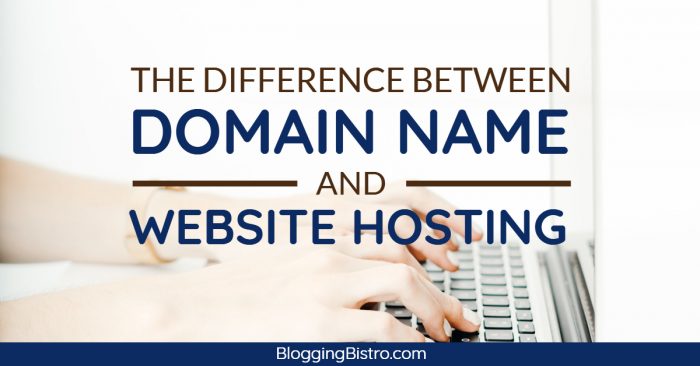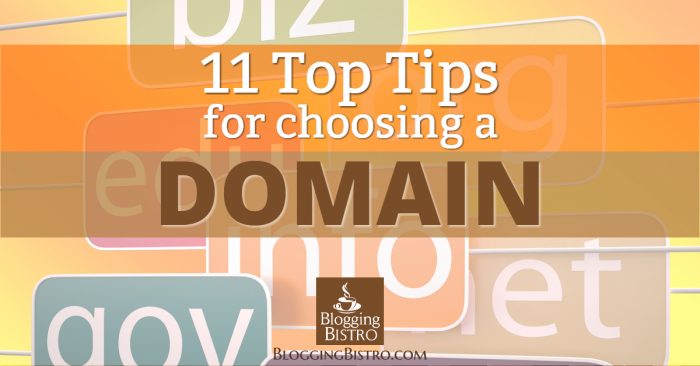The Difference Between a Domain Name and Website Hosting
 By Riya Sander
By Riya Sander
Guest contributor
When you create a website for your business or personal use, you must dive into the details. And that means understanding the difference between a domain name and web hosting, and choosing a hosting plan that’s right for your website.
What’s a Domain Name?
A domain is the name that someone keys in to their browser to get to your website. Example: domainname.com. (In most cases, there’s no need to add the prefix (www or http:// or https://) to the beginning of the domain; most sites automatically redirect you to the correct domain.)
You can further break down this address into two parts: the site’s domain (the info before the dot) and the top-level domain (the info after the dot, such as .com, .net, or .org).
You can use the domain name of your website after you pay an annual fee to register it with a domain name registrar. (Learn three key features a good registrar must offer in Laura Christianson’s article at Communicator Academy)
Quick Tips for Picking a Domain
Choosing your business domain name is just as important as choosing your company’s name. That’s because your domain is a representation of your brand.
Here are 9 tips to help you choose a domain:
1. Keep it short and easy to type

A long and complex domain invites misspellings and mistyping errors.
2. Use keywords
This helps Google – and visitors to your site – know instantly what your brand is about.
3. Use the name of your location
If you’re a local business, customers are likely to stumble across your site when they search for goods or services in their area.
4. Avoid numbers and hyphens
They can easily be misunderstood. A customer may not be sure whether to use the actual name or alphanumeric figure for a number and can also easily leave out a hyphen.
5. Make it memorable
The more appealing and catchy domain names sound, the easier they are to remember.
6. Do Research
After picking a domain you wish to use, make sure it’s not already taken by another company or website.
7. Use an appropriate domain name extension
Dotcom is easiest for people in the U.S. to remember, but you can also grab other extensions, such as .net, .info, .life, .biz, .co, .me.
8. Be Quick
The worst part about choosing a domain name is that they go so fast. Due to high demand, decide on one as quickly as possible and reserve it, regardless of whether you’ll use it right away.
9. Don’t allow others to gain from your brand
The internet is full of people who want to gain where they didn’t put in the effort. They create copycat domain names with the wrong spelling. To prevent people from stealing your traffic, purchase common misspellings of your domain. That way, people can still find your site, even if someone misspells it.
More Domain Research Tips!

Here are 5 more strategies for researching domain names from Laura Christianson of Blogging Bistro. Plus, get Laura’s free Cheatsheet: 11 Top Tips for Choosing a Domain Name.
The cheatsheet recaps the five tips in Laura’s blog post at Communicator Academy, plus you’ll get additional tips:
- Why you should try to buy a dotCOM
- Domains to consider buying when the dotCOM is taken
- How to research keyword-driven domain names
What’s Web Hosting?
Basically, web hosting means hiring a service that rents you a “server” for your website. Your site’s files are granted a particular space on a server that’s owned by a data center connected to the internet. You need both a domain (website address) AND a host (space on a “server” computer, device, or program where your website’s content lives).
Quick Tips for Choosing a Web Hosting Service
When choosing a web hosting service, it’s important to choose one that caters to your website’s needs. The server must be able to facilitate your traffic and expand in the future. Consider several options for hosting plans.
Need to Plan a Budget for a Domain, Hosting, and Other Website Must-Haves?

Enroll in Laura Christianson’s self-guided online course: Your Website Budget Blueprint.
During the video course, you will:
- Confidently pre-plan every feature your website might include.
- Create a realistic budget for your new website – one that could save you hundreds of dollars.
- Determine exactly which areas of the creation process you might need help with.
- Get clear on confusing tech terms, such as self-hosted vs. website builder, free vs. premium themes, and domain vs. hosting.
- Know precisely what questions to ask prospective website companies so you get the biggest bang for your buck.
Learn more and enroll at websitebudgetblueprint.com
 About our Contributor:
About our Contributor:
Riya is delighted to work with aspiring small business owners. She is a part of the content marketing team behind VPS HiSpeed, a virtual server company hosted in Thailand. Check out her Twitter @sanderriya.
Contributer : Blogging Bistro

 Reviewed by mimisabreena
on
Sunday, March 17, 2019
Rating:
Reviewed by mimisabreena
on
Sunday, March 17, 2019
Rating:













No comments:
Post a Comment